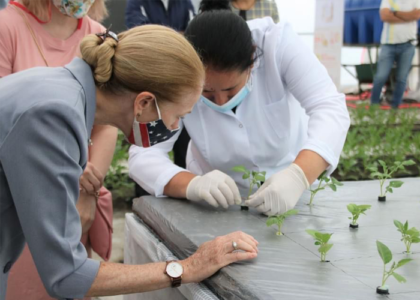In the USAID Potato Program in Georgia, led by the International Potato Center (CIP), women are challenging norms and directing important scientific work that will improve food and nutrition security for all Georgians while boosting incomes for small farmers.

Known in Georgia as “second bread,” potatoes are a staple of family diets throughout the country. However, for potato farmers, harvests lag well below production potentials. This gap is largely due to the challenge of creating a seed system free from pests and disease.
Fortunately, women scientists are stepping up to help increase production potential for Georgian farmers.
Meet Dali Tsiklauri and Natia Abuladze from CIP. They are among a small (but growing) group of women in Georgia who challenge themselves through their work and dedication.
Tsiklauri is a research technician for the Georgia Potato Program, managing field trials for potato varieties and demonstration plots for potato farmers. For the last two years she worked with 310 farmers, instructing them in innovative agronomic techniques for potato. She also spearheaded the implementation of an adapted technique for transplanting in-vitro materials into greenhouses – a technique that has a 95% success rate.
Meanwhile, Abuladze works as an in-vitro laboratory specialist who leads the one segment of the program’s 3G approach. She employs innovative technologies to help shorten the time needed to produce clean, certified potato seeds. This work paves the way for stronger market opportunities for farmers who can use improved seeds for better yields.
From early childhood Natia loved taking care of flowers. She remembers that every time she felt lonely or sad, time spent in the garden would improve her mood. These memories inspired her career path, and now she bestows the same loving care on potato seedlings and contributes to developing the potato sector in Georgia.

The 3G approach is an example of the “participatory market chain approach” employed by CIP and other CGIAR research centers to ensure that all voices from farm to home to market are heard to build the best seed system possible – for all Georgians!
Rusudan Mdviani, CIP’s regional leader for Central Asia and the Caucasus, says Tsiklauri and Abuladze are instrumental in developing potato varieties with resistance to potato scab and have become leading authorities in Georgia on innovation and best agronomic practices.
Beyond their scientific achievements and the potato sector in Georgia, Tsiklauri and Abuladze’s work provides inspiration to other women who want to work in this field. While they are proud of their accomplishments, they recognize that science and agriculture remain areas where women are under-represented. Despite this, Tsiklauri tells young women scientists to follow their hearts.
“Do what you love. It does not matter if the field requires hard physical work or not. Women have much to offer agriculture and our country,” she says.
